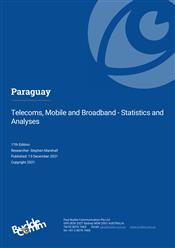Paraguay Telecoms Market Report
Telecoms, Mobile and Broadband - Statistics and Analyses

RNFO: 18,000km of fibre integrated throughout Paraguay
The state-owned incumbent, Corporación Paraguaya de Comunicaciones (Copaco), retains a monopoly on all fixed-line voice services, including local telephony, international long-distance telephony, and VoIP. In the mobile market, however, there has been effective competition since 1998. The internet market is also open to competition, and there are over a dozen ISPs offering services. Copaco lost its monopoly over the international backbone for internet connectivity in early 2009.
The mobile market is served by four operators: Tigo (the market leader), Telecom Argentina’s Núcleo, América Móvil’s Claro, and Copaco’s Vox. Operators have capitalised on the opportunities created by poor fixed-line infrastructure, and by growing consumer demand for mobile voice and data services.
The mobile market accounted for around 97% of telephony subscribers as of early 2021. About 96.6% of the population is covered by LTE services.
A major drawback for Paraguay’s telecom sector is that the country is landlocked, making it dependent on neighbouring countries for interconnection with submarine cable networks. This led to high prices for fixed broadband services, which in turn hampered growth in the sector and has resulted in relatively low penetration. Available technologies include DSL, cable, fibre, and WiMAX. Copaco has a near-monopoly in the DSL market, given that there is little regulatory provision for unbundled local loops and other access mechanisms. DSL is the main fixed broadband technology, but it is unavailable in much of the country. There is a fast-growing fibre broadband market, though the number of subscribers remains small, and network builds remain limited to certain pockets within the major cities.
Copaco’s main competitor in the fixed broadband market is Millicom’s Tigo, which offers cable broadband under the brand name Tigo Hogar. The service is available in Asunción and neighbouring towns. Tigo also provides broadband using WiMAX and FttP technologies.
BuddeComm notes that the outbreak of the Coronavirus continues to have a significant impact on production and supply chains globally. During the coming year, the telecoms sector to various degrees is likely to experience a downturn in mobile device production, while it may also be difficult for network operators to manage workflows when maintaining and upgrading existing infrastructure. Overall progress towards 5G may be postponed or slowed down in some countries.
On the consumer side, spending on telecoms services and devices is under pressure from the financial effect of large-scale job losses and the consequent restriction on disposable incomes. However, the crucial nature of telecom services, both for general communication as well as a tool for home-working, will offset such pressures. In many markets the net effect should be a steady though reduced increased in subscriber growth.
Although it is challenging to predict and interpret the long-term impacts of the crisis as it develops, these have been acknowledged in the industry forecasts contained in this report.
The report also covers the responses of the telecom operators as well as government agencies and regulators as they react to the crisis to ensure that citizens can continue to make optimum use of telecom services. This can be reflected in subsidy schemes and the promotion of tele-health and tele-education, among other solutions.
Key developments:
- América Móvil spins off towers and other related passive infrastructure in Latin American markets;
- 5G mobile licences will not be available for auction until 2024 at the earliest;
- RNFO - 18,000km of fibre deployed so far;
- MITIC, MEC and the Korea International Cooperation Agency aim to improve accessibility to education through a multimedia education support centre;
- State-owned Tier-3 data centre and NOC to be built in Villa Hayes;
- MITIC, Conatel, and Tigo inaugurate the first of ten Telecentres;
- MITIC enables more than 100 free internet points throughout the country, providing services to more than 1.3 million citizens;
- Government modernises its regulatory framework with the assistance of a $90 million loan from the Inter-American Development Bank (IDB);
- Report update includes the regulator's market data for 2020, operator data to Q3 2021, updated Telecom Maturity Index charts and analyses, assessment of the global impact of Covid-19 on the telecoms sector; recent market developments.
Companies mentioned in this report:
Copaco, Millicom (Tigo Paraguay), Vox, América Móvil (Claro Paraguay), Grupo Clarin, DirecTV, Personal (Telecom Argentina).
Related Reports
- 2019 Latin America - Mobile Network Operators and MVNOs
- Caribbean - Telecoms, Mobile and Broadband - Statistics and Analyses
- El Salvador - Telecoms, Mobile and Broadband - Statistics and Analyses
- Chile - Telecoms, Mobile and Broadband - Statistics and Analyses
- Brazil - Telecoms, Mobile and Broadband - Statistics and Analyses
- Guyana - Telecoms, Mobile and Broadband - Statistics and Analyses
- Mexico - Telecoms, Mobile and Broadband - Statistics and Analyses
- Guatemala - Telecoms, Mobile and Broadband - Statistics and Analyses
- Uruguay - Telecoms, Mobile and Broadband - Statistics and Analyses
- Argentina - Telecoms, Mobile and Broadband - Statistics and Analyses
Share this Report
TMT Intelligence
A platform to scale your intelligence tasks
Monitor critical insights with our AI-powered Market Intelligence Platform gathering and analyzing intelligence in real time. With AI trained to spot emerging trends and detect new strategic opportunities, our clients use TMT Intelligence to accelerate their growth.
If you want to know more about it, please see:
Research Methodology
BuddeComm's strategic business reports contain a combination of both primary and secondary research statistics, analyses written by our senior analysts supported by a network of experts, industry contacts and researchers from around the world as well as our own scenario forecasts.
For more details, please see:
More than 4,000 customers from 140 countries utilise BuddeComm Research
Are you interested in BuddeComm's Custom Research Service?
Hot Topics
News & Views
Have the latest telecommunications industry news delivered to your inbox by subscribing to BuddeComm's weekly newsletter.